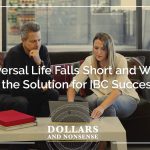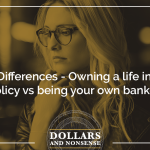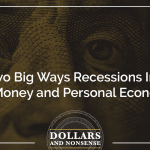In this episode, we discuss the dangerous pitfalls of trying to use Universal Life Insurance to act as a bank. Plus, we explain why Participating Whole Life Insurance as your IBC banking tool is far superior.
Universal Life Insurance Topics Discussed:
- The brief history of ULI as it related to Infinite Banking.
- How and why ULI backfired
- What ULI really is, in simple terms
- A real life example of devastating loss and failed promises of ULI
- Not being misdirected by an empty promise of guaranteed rate
- Understanding the lack of guaranteed cash value in ULI
- Indexed Life
- Variable Life
Episode Takeaways:
Powered By the Tweet This PluginPowered By the Tweet This PluginPowered By the Tweet This Plugin
Episode Resources:
- Wall Street Journal Article mentioned – A 1980s Sensation, Has Backfired
- What is Infinite Banking
- Get your copy of the Tree of Wealth ebook mentioned on this episode
Podcast transcript for episode 52: Danger of Universal Life Insurance
Nate: In this episode we will discuss the dangerous pitfalls of trying to use universal life insurance to act as a bank. And also why we suggest using participating whole life insurance as your banking tool. The benefits that it can bring as opposed to trying to do it elsewhere. She’s Holly, and she helps people find financial freedom.
Holly: He’s Nate. He makes sense out of money. This is Dollars and Nonsense. If you follow the herd, you will be slaughtered.
Nate: We’ve probably done some that have been like this but it’s still a question that we get pretty often. You know when we’re talking to someone who may be trying to see wealth differently and they run into us and they start investigating the Infinite Banking concept. And maybe they already have a universal life policy or some other sort of policy that’s not one that we suggest using for IBC. And they kinda wanna know why we don’t suggest using those. And they’re kind of in the forefront of a lot of advisors talking to their clients as well. For whatever reason, it’s kind of been lost some of the reasons why so that’s why we wanted to do this episode. Is really bear down into some of the issues that we’ve seen, and why we think that the whole life is still and really always should be the best banking tool around.
Holly: And I think Nate, it goes back to that term we’ve heard a lot, buy term and invest the difference. When universal was created that’s basically what insurance companies did. They invented a new product that basically was a way of buying term and investing the difference.
Nate: You used to just be term and whole life and then there was this new one that was universal life, which is essentially, was buying term and investing the difference at the insurance company. That’s kind of what it was. It was the whole point of it at least.
Holly: Yeah and at the time they thought hey you can maintain a level rate, it was cheaper once again than whole life in their viewpoint, and you would have money for retirement down the line whether that be twenty, thirty years later because you would’ve put this money into a product that cost you less money. And by investing it in mutual funds, money market accounts, and basically you would have more money in the future.
Nate: Yeah and that was the goal and unfortunately, for everyone who did buy them back in the 1980s, 1990s. It has not worked out very well. Not nearly what people thought it was going to be. And part of what drew this episode to the forefront was a recent article at the Wall Street Journal where it talks about universal life, which was a 1980s kind of boom sensation, has completely backfired. Story after story, we’ve seen them in person, we’ve read articles about them, of individuals who bought these types of policies, who are now…
One of the first things it says in the article was, one individual 35 years ago bought a policy paying $56 a month in premium, and it has now climbed to $285 a month, even though she’s had to reduce the death benefit over and over and over just to try to keep it alive. And I mean it’s terribly sad. She’s on social security trying to survive and her universal life that was promoted as a great alternative to term and whole life, being the best of both worlds, is now costing her a lot of money.
And for those of you who don’t know Holly, universal life really is annually renewable term. Just term insurance with a side fund. And the problem is that the term insurance every year gets more expensive, automatically. As you age, term insurance gets more and more. So every year there’s more and more cost to it. And if the savings account, on the side, does not produce enough of a return, then the cost will eat up the cash value and you’ll have to continue to pay more and more into it just to keep the policy afloat, let alone, see any value, cash value, in the policy.
Holly: In this article, the individual’s having to constantly lower her death benefit because of her age. And so it’s so much more expensive as you get older to maintain even a small death benefit based on your age when you’re only buying one year term. Cause that’s really what it is, one year renewable term.
In generations in the 80s, 90s, and you know whether they be 90, 80, 70, even 60s, they bought into a product that they really believed in would be good for them and long term it actually is proving that it’s not. It’s not an absolute that it’s bad, but I would say that it. When you think ice cream, like in this article is a splurge, just because you’re trying to afford the premium on your life insurance, it’s really hard to fathom all the work you’ve done for the numerous years, 35 years in the making, that you can’t even splurge on ice cream.
Nate: I know. I mean there was another individual in the article who had paid approximately $39,000 into her policy which is more than the death benefit is at this time. So I mean it’s ridiculous. She’s lost money. It would’ve been better to put it in a shoebox. You know, it’s just unbelievably ridiculous. So we could go on and on but to me Holly, there’s two main worries and concerns that I have whenever looking at a universal life policy. The two biggest ones, and the article does address this.
The biggest one I think, not only is the return very volatile as far as we really don’t know. But mainly the mortality cost, the actual cost and fees inside the policy, can change. And at any point the insurance company, whoever issued the policy has a right to increase the mortality costs inside the policy. If the returns don’t work out very well then it’s not gonna look very good anyway. But on top of that, even if the returns do look good all they have to do, is increase the cost of the policy if necessary. So some people through no issues of return, quote on quote on that little side savings account. But just to the fact that the insurance companies mis-price the product and have had to increase the cost of it. They’re literally lapsing and losing money year in year out just because, I mean mortality costs go up every year for the annually renewable term just to begin with. But if they even increase the fee structure on top of that.
There’s one individual who wrote an article on life insurance. A book for the American Bar Association. And he mentions in there that 90% of the older policies that he reviewed were a ticking time bomb, going to implode at some point. And that is too scary for me to stomach, that the insurance company at any time could just decide to change the mortality cost above and beyond just the normal trajectory of that term insurance. And could cause your policy to just implode without you missing a beat.
Holly: Yeah and become so expensive you work your way out of a policy.
Nate: I mean I’ve looked at a lot of policies Holly. Of like indexed universal life, which is kind of the new kid on the block. They always show what is guaranteed to happen. Like very worst case scenario guaranteed. And then the non-guaranteed, what they hope is going to happen assuming it returns well. The guaranteed side of like an [inaudible 00:07:16] policy almost always implodes. It turns to zero before the person even reaches like 75.
Holly: And even those that don’t, it’s gonna be shortly thereafter that it implodes. I’ve looked at numerous policies as well, and individuals. I’ll be honest and say I’ve had more than one client that had a universal policy for numerous years and then all of a sudden it became so expensive. We’re not just talking middle class here. We’re talking even doctors and people that you think make a lot of money, that can’t even afford their monthly payments because it doesn’t over the death benefit. And it becomes so expensive they just surrender the policy basically just to get out of having anything because there is no money being invested even in savings because they’re having to pay so much money just to keep that existing policy. $200,000 maybe I wanna leave my family that in a death benefit right? We think maybe twenty, thirty years ago that was a lot of money. Today after twenty or thirty years it doesn’t buy nearly as much, but the more you have to reduce it the less money there is available even for your family or to take out and live on.
Announcer: Are you tired of being stressed about money? The Dollars and Nonsense podcast is sponsored by Living Wealth. Visit livingwealth.com/freedom to get your free Smart Money eBook and sign up for a personal wealth presentation today. Living Wealth is a family owned and operated business which works with individuals, families, and even businesses, to slay the money stress dragon. Our clients receive individual coaching, regarding wealth creation, and how to create a retirement income. You’ll be enable to have cash today, and in the future. Since 1972, Living Wealth has been committed to educating smart people on basic money principles. To assist them in becoming debt free, and finally find financial freedom. Let us help set you free. Remember to visit livingwealth.com/freedom to receive your free eBook and even sign up for an individual wealth presentation today.
Nate: It’s scary to me. I wouldn’t wanna put myself in that risk. That’s why of course we do use participating whole life insurance as the tool in comparison, is because they can’t just change the mortality cost of the policy and start eroding the cash value. It’s impossible.
And that kind of brings me to my next point I wanted to make Holly on the second big issue I’ve found which is, in a universal life policy, there may be what’s called a guaranteed interest rate, like a minimum interest rate that the policy can earn. But there is not a guaranteed cash value of the policy. In other words in a participating whole life, the ones who used to do IBC. At the very beginning of the policy, you have a contract. And in that contract you can look out every year for the rest of your life unless you live past the age 121. So for those of you who have really long life expectancy, maybe you’ll get past the chart. But it goes all the way out to age 121. It’s not based on some guaranteed interest rate. It’s actually a number, a cash value, that is contractually guaranteed from the very beginning, unlike universal life. And there is no number. You can’t look out 30 years down the road and know exactly the amount of money you’re gonna have guaranteed. You look at universal life and you look at their guarantees and it implodes in 30 years. So you’re hoping you do better than the guarantee, is really what you’re hoping or else you’re gonna lose every dollar you put into it.
There’s certainly a difference between having a guaranteed interest rate on a policy and actually a guaranteed cash value. Which is why a whole life policy can never implode on itself necessarily, because you’re guaranteed to have more money each and every year compounded, than you did the year before. As opposed to universal life, where costs can increase, returns can decrease, and you can find yourself with no money in the cash value, just paying into this universal life policy just to pay the cost of it and have lost every dollar you put in just hope you can keep it afloat until the death benefit gets paid out. And that’s never a position I wanna put myself in.
Holly: We always need money today to live on. There’s so many Americans and individuals who’ve really planned for retirement, and they bought policies, universal policies, I’m gonna be honest, life insurance policies, thinking that that was gonna provide for them on top of maybe their social security or they were a teacher and they’re pension. Whatever it may be. And what they found out is, they can’t survive with the pension and even the social security so they’re actually having to live a much different lifestyle just hoping there’s something in the future. And I don’t wanna hope that there’s something in the future. I wanna know that in the future there is something. Which is what Nate said, that guaranteed cash value verses guaranteed interest rate. It’s very, very different. That you want to have something you know is gonna exist in the future and not something that just, “Ope sorry, you gotta triple your premium or quadruple it, or reduce the death benefit just to keep it and hope that you have enough money to live on.” I mean most of the time, people are living longer today so chances are, when you’re in your eighties or you’re in your nineties, you wanna know you have something in place that provides a sense of, not just financial security but financial freedom too.
Nate: As I’ve said many times individuals. You know a guaranteed interest rate on zero dollars is still zero dollars. I mean a lot of these people who were losing a lot of money in universal life, of course those policies have guaranteed interest rates. Three, four percent guaranteed interest rates and yet they’re still losing money to the point that they have lost everything they put into it. How is that possible when you think, mentally, “Oh it’s guaranteed to earn me three to four percent each year. That’s the worst case, that sounds great.” And yet you have these policies that are imploding and losing every dollar because it’s not about the interest rate. They didn’t have a guaranteed cash value. The expenses were just greater than the amount the interest was earning for ’em. And so it was just depleting the account down to zero.
And it’s a horror story. That’s why life insurance can get a bad name I think, by the way Holly. It’s not because of participating whole life insurance has been around for 200 years. That has nothing to do with some of the issues with the insurance entry. It’s these new products, as they’re trying to develop universal life, indexed life, variable life. All these different types of insurance policies that they’re trying to do things that shouldn’t be doing to help their agents sell policies that sound good. And they did sound good, they just failed. And it just should never have been done.
Holly: Yeah and I think the honesty is actually being willing to look at what is this product that you’re buying that somebody’s trying to sell you, and be honest with it. I mean Nate, if you saw a good universal policy, I think I would be honest and tell an individual, “Hey this is a good policy,” if it was in fact a good policy. I just talked to someone who, it’s a horrible policy and they’re in their forties right? And if they don’t do something to get rid of this policy, then they’re not gonna have anything. Period. When I looked at it, I was like you can’t keep doing this. You either have to find a job where you make three times as much money and hope that there’s money in the future. Or you gotta surrender it and take what you’ve put in and do something with the cash. Cause it actually was better for the individual to either take all the cash, and like you said, put it in a shoebox, than to leave it in this policy that’s doing nothing.
Nate: Yeah, I met a guy who did like a single premium universal life where he put in $75,000 just upfront one time. Didn’t know what he was doing, I think it was maybe his parents who tried to help him get that. I’d like for me to look at this policy and say, “Yeah it’s great, great idea. You should keep it.” And you look at it and he’s guaranteed to run out of money even assuming the projections, he’s gonna run out of money. I think he was fifty-something and it was gonna run out of money in about twenty to twenty-five years. You gotta get outta this. You’re gonna lose all the money you put in. I mean you have no chance of success.
I’m not saying that every universal life policy stinks. There could be some good ones. I’m not an absolute kind of guy. I’m sure there’s people who own them that are happy with them. But I never heard horror stories with participating whole life insurance, you know done the way we do it, like I have with universal life insurance. I hear horror stories every week, from somebody who comes in, shows it to me, and they’re just losing money. And I’m sitting here thinking to myself guys it’s just a time bomb. It’s going to implode and the longer you live the higher the chance that it’s going to cause the expenses just keep going up and up.
Holly: I think really understanding the bottom line that when these into effect, we were in a higher interest rate environment Nate. And we’ve been in a low interest rate environment well over ten plus years. And these aren’t doing them any good because the projections don’t look good for the future. If somebody can say, “Hey I’ve looked at these policies for 10 years,” like this article says, “and 90% of them are bad.” I wanna be part of the 100% that it’s a good policy verses the 90% that this policy’s gonna fail.
Nate: Yeah so if you’re building a bank, which is what we teach people how to do at Living Wealth. Kind of outside the box strategy using participating whole life insurance. If you’re gonna build a bank, you want to make sure that the bank, the source of your wealth building strategy. The center is not something that’s built on a faulty chassis. It’s not built on an unstable foundation. It’s something that’s gonna increase each year, each and every year, guaranteed from the very beginning. No outside source can come in and insurance companies can’t increase expenses and returns cannot happen and the policy just imploding, it just can’t happen and it’s never happened for 200 years. It’s the best place we know of to do it.
These are of new product [inaudible 00:17:27] since the 1980s. We’re just now seeing the result of policies that were being owned thirty, thirty-five years, when they first came out in the 80s and we’re seeing what it looks like over a period of time. And it’s not good for at least those policies. I’m not saying that the ones today would look the same 35 years ago. I don’t know. But from the point of view that we have right now, this younger new, that baby brother of insurance history, universal life, has not worked thus far nearly as well. And it’s still being sold as something great, but I just wouldn’t build my bank on that premise. I don’t think it’s worth the risk.
Holly: If you’re gonna buy a product, you wanna know it’s gonna be successful. And I’m gonna buy a product like Nate said that’s been around 200 years and I can say my own grandmother had a policy for thirty- five plus years. Longer than that even, forty plus years. And she still did better with her policy that if she’d ever done a universal policy. I mean forty years she had the policy. It survived, it grew. She could live off of it and it worked. And so I think that that’s where you have to really look. You have to look at what’s been tried and true. Do you want something that’s been around 200 years or something that’s only been around thirty-five years. I wanna buy a product that I know has withstood the test of time. Withstood the depressions, withstood wars. Everything that goes on. The rise and fall of the economy and different crises and they’re still around. And they still exist.
Nate: There’s nothing better out there to do it with, Holly. And if there was we would just use it. You know with that being said, just understand there’s a couple of pitfalls, when trying to use it. The biggest ones are that the fees and cost are not set in and there is no guaranteed cash value ongoingly. There may be a guaranteed interest rate, but that does not mean that you’re guaranteed to make money each year. A lot of people have lost a ton of money in places that we’re guaranteed to have a certain interest rate as a minimum. Happens all the time. It’s been happening for thirty-five years now. Don’t mess around with it if you want to build it for a banking tool or a security tool. But that being said guys, this is Dollars and Nonsense. If you follow the herd, you will get slaughtered.
Announcer: For free transcripts and resources, please visit livingwealth.com/e52.









